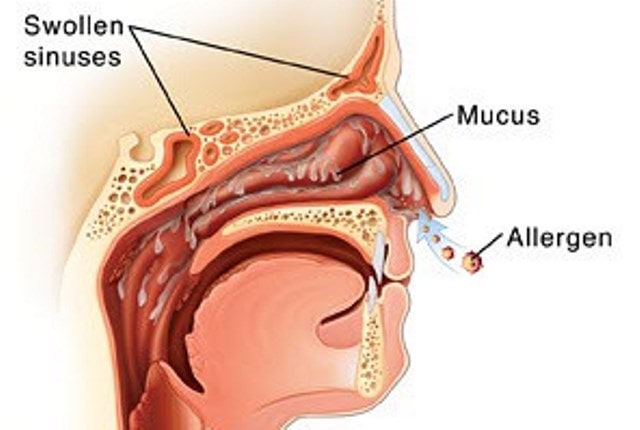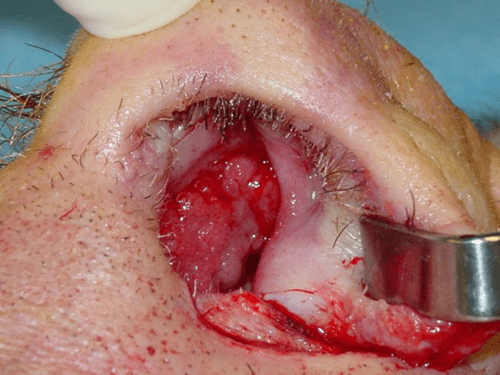Do you have a baby with stuffy nose or has your baby become easily irritable? Are they exhibiting signs of difficulty in breathing? This could be as a result of a nose that is stuffy. In breast-feeding babies, this may cause difficulties in feeding. Sleeping may also be hard for them. Below we discuss the causes of a baby stuffy nose including infants, and toddlers.
My Baby Has a Stuffy Nose, What Causes It?

There are a number of factors which contribute to baby stuffy nose. These include:
Dry Air
Babies are born with tiny organs. Their nasal passages are usually narrow as a result of their tiny noses. When they get exposed to dry air, their nasal secretions dry up. This may result in a stuffy or clogged nose.
To clear up the dried up nasal secretions, use saline drops. Using humidifies may also help to moisturize the air thus help unclog the nose.
Irritants
Cigarette smoke, dust, wind, chemical fumes and breast milk which comes up when the baby is burping are some of the things that could irritate a baby’s sensitive nasal passage. These lead to a stuffy or clogged nose and clear discharge. Using saline drops will help ease the congestion.
Colds and Flu
The immune system of a baby is normally still immature in their first year. As a result, they are likely to experience colds. These may be acquired from being handled by people who have colds. They may have a running nose with clear discharge which then turns to green and yellow afterwards. This will be followed by congestion.
Allergies
Children who suffer allergic reactions experience clear watery discharge. They also sneeze a lot and may have itchy noses. Babies who react to allergens may have stuffy nose when subjected to allergens. To take care of this, the mother has to learn what their babies are allergic to to help avoid them. Seeing a doctor will get recommendation on what to use. Never administer antihistamines to babies without consulting a pediatrician.
Enlarged adenoids
These are found behind the nose and help to defend the body against infections. When children are born, the adenoids grow and increase in size within the first four years. They then get smaller. Some children are born with large adenoids which may have developed before they were born while still in the womb.
Enlarged adenoids
Enlarged adenoids block the nasal cavities and at times they may be severe such that they block it completely. They may also affect the ears and cause formation of fluid in the middle ear. Sleep disturbances may occur as a result of nose stuffiness.

Adenoids are a structural deformity and only surgical procedure may correct it. The baby may have to be referred to an ear, nose and throat specialist.
Foreign Bodies
It is very rare for children to admit that they have inserted objects into their nose. Parents will only start seeing the symptoms. Stuffy nose in babies may be as a result of obstruction caused by insertion of foreign bodies into the nose.
By the time the nose gets stuffy as a result of foreign objects, the nasal membranes have been inflamed. There is no need trying to remove it. A doctor should be seen immediately.
Newborn with Stuffy Nose or Newborn Baby Stuffy Nose
It is possible to have newborns with a stuffy nose as early as two weeks. This may be caused mostly by the fact that their immune system is still developing.
Structural deformities could occur during birth too. As shown by research, seven percent of newborns suffer nasal injury during the birth process.
The nasal cavity is yet to develop fully and is quite small. This may make them get stuffy easily since only a little dried up nasal discharge will congest it.
Another thing that may cause stuffiness is environmental changes. Since the baby is yet to get accustomed to the surrounding, any drastic change may lead to stuffiness.
Being born with enlarged adenoids may also be the reason for a stuffy or blocked nose.
Toddler Stuffy Nose
The word toddler is normally used to describe a baby who just learnt how to walk. This is a baby who has adapted well to their surroundings. They tend to be very explorative and there is a possibility for the cause of their stuffy or clogged nose to be the presence of foreign objects in their nose.
A doctor should be seen immediately to have it removed.
Infant with Stuffy Nose
The word infant is used interchangeably with newborn. These are babies who are just adjusting to being in this world. Some of the things that could cause lead to an infant having a nose that is stuffy include enlarged adenoids, under-developed nasal passage and their immunity being weak.
How to Help a Baby with Stuffy Nose
There are a number of ways through which one could help a baby with a stuffy nose. Home remedies could be used for short term relief while treatment may help for the log term.
Baby Stuffy Nose Remedies and Home Remedies

Saline solution: This is something that a one can make at home. Use one cup of distilled water and dissolve one teaspoon of table salt. Put a drop or two in each nostril.
Steam Session: Get the baby to the bathroom and turn on hot water with the door closed. This will humidify the bathroom. When the baby takes breaths it will help to ease the stuffiness. Filling a vessel with hot water and keeping it in the room where the baby is can serve the same purpose.
How to Clear Baby Stuffy Nose
There are treatment aids to clear baby stuffy nose. These include:
Vaporizers or humidifiers: Where nose stuffiness is being caused by dry air, humidifiers and vaporizers will help moisten dry air. This will help to relieve nasal congestions. Where one has none of these, boiling water and placing it in the room where the baby is will serve the same purpose.
When being used in the bedroom, one should ensure the moisture is not directed to the crib as the steam may end up making the blankets humid.
Nasal Aspirators: Where the baby is too young to blow their nose, an infant nasal aspirator may be used to remove thick and sticky nasal discharge. This though only gives temporary relieve. Avoid inserting Q-tips and cotton swabs inside the baby’s nostrils as this may lead to long term damage.
How to Help Baby Stuffy Nose at Night
To help a baby with stuffy nose at night try to elevate their head a bit by placing a rolled up towel or blanket beneath the mattress in their crib. Also ensure that they sleep on their head as opposed to sleeping on the side. These will help ease breathing. Caution should be taken not to elevate it too much or put the rolled up blanket on their mattress.
It is important to seek a pediatrician’s intervention whenever the stuffiness becomes serious. This will help avoid delayed speech development and hearing problems which could result from long term stuffy or blocked nose.


